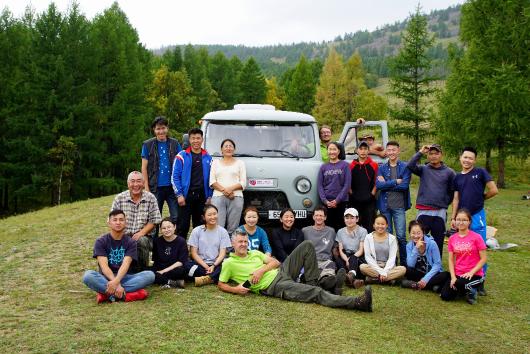
Mendel University foresters are launching an international forestry project in Mongolia
20.04.2021 / 06:19 | Aktualizováno: 13.05.2022 / 09:21
Researchers from Mendel University in Brno will lead an international university consortium in expert activities focused on sustainable management in the Mongolian landscape. They will support their knowledge of local forestry, which is low in Mongolia. There is a shortage of experts in the field and the situation with the loss and devastation of forest stands is critical. The STREAM project, which is supported by the European Commission and other partners, will start in May and has a budget of almost 20 million CZK.
Mongolia is a large inland country located on a plateau, in which most of the territory is covered by steppes and deserts due to extreme climatic conditions. Although the forest cover is only around 8%, the area of Mongolian forests corresponds to the forest area of the Czech Republic, Slovakia, Poland and Hungary together. "Water is an essential commodity here for all living things, however, all flow away from the earth in streams or are quickly lost by intense evaporation. Mongolian forests have a major and direct impact on water availability and quality, preventing erosion, permafrost degradation and providing a range of other ecosystem services. The forest zone at the transition from the steppe suffers from intensive grazing, fires and illegal logging, and the very existence of forests is endangered here," describes Antonín Kusbach from the Faculty of Forestry and Wood Technology at MENDELU.
Researchers from the Faculty of Forestry and Wood Technology have been involved in the research of Mongolian forests since 2009. Locals teach the principles of sustainable forest management, the importance of the forest for maintaining permafrost and water in the landscape and other professional activities. In Mongolia, Czech researchers have set up research areas where students measure soil moisture and monitor the effect of grazing on natural rejuvenation, forest vitality and vegetation dynamics. There were also bilateral exchanges of academics associated with lectures and field demonstrations of research activities, data collection and demonstrations of economic measures.
"Through the well-established Mendel University, the Czech Republic has been cooperating with Mongolian forest management planning institutions for many years and provides education to Mongolian experts in forest and landscape ecology. The expertise provided by the consortium in cooperation with the Mongolian institutions will strengthen the research and education component of the STREAM project," said Jiří Brodský, Ambassador of the Czech Republic to Mongolia, at the signing of the project.
Due to the experience of Brno scientists and also thanks to the support of the Czech Embassy in Ulaanbaatar, MENDELU will lead a consortium of 11 universities in the STREAM project (Sustainable Resilient Ecosystem and Agriculture Management in Mongolia), which will be implemented in cooperation with the European Commission (EC), Food and Agriculture Organization of the United Nations (FAO), the development organization Deutsche Gesellschaft für Internationale Zusammenarbeit (GIZ) and the Mongolian Ministry of the Environment and Tourism.
This pilot European forestry project in Mongolia aims to contribute to the implementation of innovative and long-term sustainable farming principles in the countryside by 2024, taking into account the challenges posed by the food system and climate change. STREAM is a test of partnership for a future even larger development project of this type. "Our university and the entire consortium will be responsible for practical cases of economic measures, such as reforestation by applying ecologically and socio-economically sound management methods, afforestation, educational and conservation practices in six selected pilot areas in the provinces of Selenge and Khentii. In addition, we will mainly cover research and educational activities related to sustainable forest management," added Kusbach.
Contact for more information: Ing. Antonín Kusbach Ph.D., kusbach@mendelu.cz, Department of Forest Botany, Dendrology and Geobiocoenology (FFWT)



